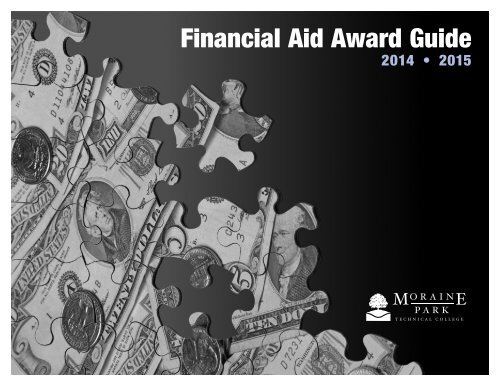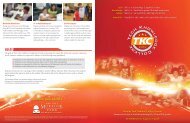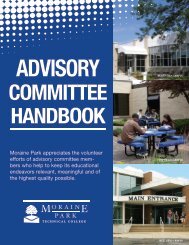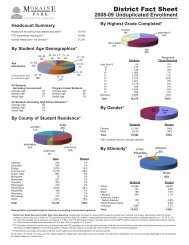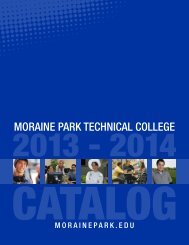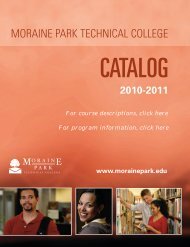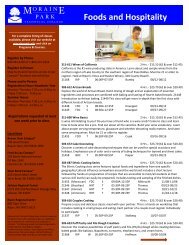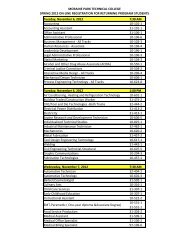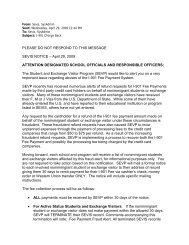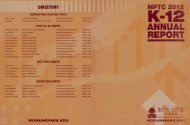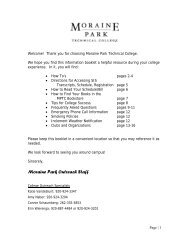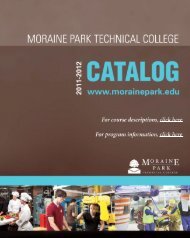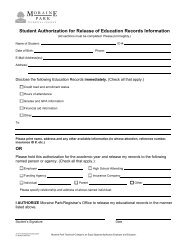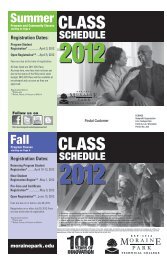Financial Aid Award Guide - Moraine Park Technical College
Financial Aid Award Guide - Moraine Park Technical College
Financial Aid Award Guide - Moraine Park Technical College
Create successful ePaper yourself
Turn your PDF publications into a flip-book with our unique Google optimized e-Paper software.
<strong>Financial</strong> <strong>Aid</strong> <strong>Award</strong> <strong>Guide</strong><br />
2014 • 2015
Student Services Center<br />
Beaver Dam Campus<br />
700 Gould Street<br />
Beaver Dam, WI 53916-1994<br />
Student Services Center<br />
Fond du Lac Campus<br />
235 North National Avenue<br />
PO Box 1940<br />
Fond du Lac, WI 54936-1940<br />
Student Services Center<br />
West Bend Campus<br />
2151 North Main Street<br />
West Bend, WI 53090-1598<br />
Student Services Call Center<br />
920-924-3207<br />
Toll-Free 1-800-472-4554<br />
TTY/VP: Use Relay/VRS<br />
financialaid@morainepark.edu<br />
The information in this publication is subject to change<br />
without notice.<br />
IMPORTANT: Refer to this <strong>Award</strong> <strong>Guide</strong> for the<br />
entire school year. It will answer most of your<br />
questions. Day and evening program Cosmetology<br />
students should refer to their program addendum for<br />
information marked with an asterisk (*).<br />
Table of Contents<br />
<strong>Financial</strong> <strong>Aid</strong> <strong>Award</strong> Offer Basics. .............. 2<br />
<strong>Financial</strong> <strong>Aid</strong> <strong>Award</strong>ing Process ................ 2<br />
Verification Process. .......................... 2<br />
How <strong>Financial</strong> Need Is Determined ........... 2-3<br />
Accepting Your <strong>Financial</strong> <strong>Aid</strong> <strong>Award</strong>. ......... 3-5<br />
Disbursement Policy. ........................ 3<br />
Disbursement to Your<br />
Student Account and Credit Balances .......... 4<br />
<strong>Financial</strong> <strong>Aid</strong> to Postpone<br />
Tuition and Fees Payment. ............... 4-5<br />
Bookstore Authorization. .................... 5<br />
Types of <strong>Financial</strong> <strong>Aid</strong>. ........................ 5<br />
Federal and State Grants ..................... 5<br />
Types of Grants. ............................ 5-6<br />
Federal Pell Grant. .......................... 5<br />
Iraq and Afghanistan Service Grant. ........... 5<br />
Federal Supplemental Educational<br />
Opportunity Grant. ....................... 5<br />
WHEG. ................................... 5<br />
TIP Grant. ................................. 5<br />
Minority Undergraduate Retention Grant. ...... 5<br />
BIA Grant. ................................. 5<br />
Wisconsin Indian Student Assistance Grant. .... 6<br />
Wisconsin Covenant Scholars Grants. .......... 6<br />
Fund for Wisconsin Scholars Grants ........... 6<br />
Federal Direct Loans. ......................... 6<br />
Federal Direct Loan Requirements. ........... 6-7<br />
Repayment of Loans. ........................ 7<br />
National Student Loan Data System (NSLDS). .... 7<br />
Federal Direct PLUS Loans. .................... 8<br />
Federal Work-Study Program. ................. 8<br />
How to Find a Job. .......................... 8<br />
Payroll Information ......................... 8<br />
Requesting Work Study. ..................... 8<br />
Cancelling Work Study ...................... 8<br />
Dual Enrollment<br />
(Consortium Agreements)................... 8<br />
Shared Programs............................. 8<br />
Summer <strong>Aid</strong> ................................. 9<br />
Summer Pell Grant.......................... 9<br />
Yearly Maximum Loan Amount............... 9<br />
<strong>Financial</strong> Consequence of Withdrawing or Not<br />
Passing Classes (Return of Title IV)............. 9<br />
How is the financial aid I earn calculated?......... 9<br />
What is the withdrawal date?................. 9-10<br />
Who returns the unearned federal funds? ........ 10<br />
How do I repay the unearned funds?............ 10<br />
What happens if I don’t repay?................. 10<br />
Overaward Policy............................ 10<br />
Satisfactory Progress Standards<br />
For <strong>Financial</strong> <strong>Aid</strong> Recipients ............... 10-12<br />
Satisfactory Progress Standards............ 10-11<br />
<strong>Financial</strong> <strong>Aid</strong> Warning...................... 11<br />
Suspension................................ 11<br />
Extension of Eligibility...................... 11<br />
Appeal of <strong>Financial</strong> <strong>Aid</strong> Suspension........... 11<br />
Course Repeats............................ 11<br />
Credit for Prior Learning/Transfer Credits..... 12<br />
Unusual Enrollment History................. 12<br />
Other Sources of <strong>Financial</strong> <strong>Aid</strong> ................ 12<br />
Scholarships............................... 12<br />
Seek Assistance From a<br />
Professional Organization................. 12<br />
Veteran Status............................. 12<br />
Workforce Investment Act (WIA) ............ 12<br />
Assistance for the Disabled .................. 12<br />
Temporary Assistance for<br />
Needy Families (TANF)................... 12<br />
TRiO Student Support Services (SSS).......... 12<br />
Special Circumstances ...................... 13<br />
Taxation of Scholarships and Fellowships...... 13<br />
Student Rights and Responsibilities............ 13
<strong>Financial</strong> <strong>Aid</strong> <strong>Award</strong><br />
Offer Basics<br />
<strong>Financial</strong> <strong>Aid</strong> is intended to help bridge the gap<br />
between the cost of attending <strong>Moraine</strong> <strong>Park</strong> and<br />
the resources you and your family are expected to<br />
contribute.<br />
Your <strong>Financial</strong> <strong>Aid</strong> <strong>Award</strong> notice lists the award<br />
types and amounts of financial aid you are eligible to<br />
receive for the 2014-2015 award year. Your <strong>Financial</strong><br />
<strong>Aid</strong> award is based on actual enrollment (by payment<br />
period or semester) if you have already preregistered<br />
for classes or by what you projected on your supplemental<br />
form. If you did not complete and return<br />
a supplemental form, your financial aid award was<br />
completed using assumed full-time status. If you did<br />
not complete a supplemental form and will not be<br />
enrolled full-time, you must contact the financial<br />
aid office to request a revision. If you add or drop<br />
classes prior to the date of record and your eligibility<br />
for financial aid changes, your awards will be revised<br />
(see section on disbursement for more information).<br />
There are two types of financial aid - gift aid and<br />
self-help aid. Students will be awarded a financial<br />
aid package that may include a combination of<br />
the following:<br />
• Gift <strong>Aid</strong> - Includes grants and scholarships,<br />
which do not have to be repaid or earned<br />
through work.<br />
• Self-Help <strong>Aid</strong> - Includes loans that must be<br />
repaid and work-study funds that must be<br />
earned by working.<br />
Your awards are based on the most current<br />
information available regarding your grade level,<br />
enrollment status, housing plans and academic progress.<br />
Your eligibility for these awards may change if the<br />
criteria used to calculate these awards was inaccurate<br />
or has changed. All award offers are contingent upon<br />
available federal, state, outside agency and/or college<br />
funding sources. If, at any time, <strong>Moraine</strong> <strong>Park</strong> receives<br />
notification that your eligibility for a fund changes,<br />
your financial aid award will be revised and all previous<br />
awards will be considered void.<br />
<strong>Financial</strong> <strong>Aid</strong><br />
<strong>Award</strong>ing Process<br />
The financial aid process starts with the Free<br />
Application for Federal Student <strong>Aid</strong>, also known<br />
as the “FAFSA.” The FAFSA is completed online at<br />
www.fafsa.gov each year. <strong>Moraine</strong> <strong>Park</strong>’s school code<br />
is 005303. <strong>Financial</strong> aid will not be awarded until the<br />
student has been admitted to an eligible program.<br />
The priority deadline for fall semester is April 15<br />
and October 15 for spring, but applications will still<br />
be accepted after that time. Early applicants will be<br />
given first consideration.<br />
Verification Process<br />
Some students’ files are selected for verification.<br />
Verification is the process by which the <strong>Financial</strong> <strong>Aid</strong><br />
Office compares the information on the financial<br />
aid application with source documents provided by<br />
the student as to verify the accuracy of the information<br />
on the application. <strong>Moraine</strong> <strong>Park</strong> <strong>Technical</strong><br />
<strong>College</strong> will verify the information on the Student<br />
<strong>Aid</strong> Report (SAR) for all students who complete<br />
the application process for federal financial aid and<br />
who are selected for verification by the Department<br />
of Education edits. In addition, <strong>Moraine</strong> <strong>Park</strong> may<br />
also select files for verification to resolve conflicting<br />
information.<br />
At <strong>Moraine</strong> <strong>Park</strong> <strong>Technical</strong> <strong>College</strong>, financial aid will<br />
not be awarded to those selected for verification until<br />
all documents required for verification are submitted<br />
and verification is completed.<br />
Students will be notified of the documents that must<br />
be submitted to the <strong>Financial</strong> <strong>Aid</strong> Office in order<br />
to complete the verification by use of the Missing<br />
Information Letter. The “Missing Information<br />
Letter” will list the required verification items, any<br />
other actions required to complete verification, and<br />
any other items required by the <strong>Financial</strong> <strong>Aid</strong> Office.<br />
These letters are generated weekly and sent by US<br />
Mail as SAR files are received from the Department<br />
of Education.<br />
Students who fail to bring in the documents in a<br />
timely manner will lose their priority standing for<br />
campus‐based awards and may not be packaged in<br />
time for the semester billing due date. Students who<br />
do not complete verification before their last day of<br />
attendance may have limited eligibility for financial<br />
aid funds due to federal and state regulations.<br />
If a staff member has reason to suspect that a<br />
student, employee, or other individual has misreported<br />
information or altered documentation to fraudulently<br />
obtain federal funds, <strong>Moraine</strong> <strong>Park</strong> is required to<br />
report suspicions and provide any evidence to the<br />
Office of Inspector General.<br />
How <strong>Financial</strong><br />
Need Is Determined<br />
Cost of Attendance<br />
<strong>Financial</strong> aid is awarded on the basis of need, which<br />
is the difference between your Cost of Attendance<br />
(COA) and your Expected Family Contribution<br />
or “EFC.” The student and/or parent contribution<br />
represents the amount that you (and your parents,<br />
Page 2
if you are considered dependent) are expected to<br />
contribute toward your educational expenses during<br />
the academic year. This figure is calculated using<br />
the information submitted on your FAFSA (Free<br />
Application for Federal Student <strong>Aid</strong>). Factors<br />
considered in determining student/parent contribution<br />
are income, net assets, family size, age and the<br />
number of family members in college (excluding<br />
parents). The FAFSA must be completed each year<br />
after January 1.<br />
The Cost of Attendance is an estimate of the cost for<br />
a student to attend <strong>Moraine</strong> <strong>Park</strong>. The COA includes<br />
tuition and fees, books and supplies, room and<br />
board, transportation and loan fees. It is based on<br />
the number of program-required credits you enroll<br />
in for each semester. <strong>Moraine</strong> <strong>Park</strong> may be able to<br />
increase your Cost of Attendance for costs relating to<br />
child care expenses, mileage and/or disability-related<br />
expenses. Less-than-half-time students’ expense budget<br />
includes tuition, books and transportation only.<br />
Contact the Student Services Center at the campus<br />
you will attend for more information.<br />
*Cosmetology students - please refer to your program<br />
addendum for Cost of Attendance Information.<br />
Cost of Attendance Example<br />
Estimated Cost of Attendance*. .......... $16,353<br />
Less Total Family Contribution. ........... $2,865<br />
<strong>Financial</strong> Need. ........................ $13,488<br />
*This is not your out-of-pocket expense (see below).<br />
Estimated Cost of Attendance<br />
Typical student expenses included in the average<br />
cost of going to college depends on whether you live<br />
at home or off campus in a house or apartment and<br />
how far you commute to campus.<br />
Not all costs have to be paid up front. Some<br />
expenses, such as transportation, are spread out<br />
over the year and can be met by a student working<br />
part-time during the year. Some expenses, such as<br />
room and board, may be covered by parents and<br />
will not represent an out-of-pocket cost for you.<br />
Unmet Need It is the policy of <strong>Moraine</strong> <strong>Park</strong> to<br />
first award as much grant aid as you qualify for and<br />
are eligible to receive. These funds are limited. It is<br />
possible for you to qualify for grant and self-help aid<br />
but, due to limited funds, the entire amount of your<br />
need may not be available. If your entire need cannot<br />
be funded, the remaining amount is then considered<br />
“unmet need.”<br />
Accepting Your<br />
<strong>Financial</strong> <strong>Aid</strong> <strong>Award</strong><br />
Once your <strong>Financial</strong> <strong>Aid</strong> award has been processed,<br />
you may view and accept/decline the awards that<br />
have been offered to you on myMPTC.<br />
Online acceptance instructions:<br />
1. Under “<strong>Financial</strong> <strong>Aid</strong> <strong>Award</strong>s” on the “Student”<br />
tab, click <strong>Financial</strong> <strong>Aid</strong> <strong>Award</strong>s. Select the<br />
appropriate award year (2014-2015).<br />
2. On the “<strong>Award</strong> Overview” tab, you will see an<br />
overview of the cost of attendance, expected<br />
enrollment, and your financial aid award. You are<br />
also able to print a copy of your award letter here<br />
for your records.<br />
3. If you are receiving other funding/scholarships,<br />
you can enter this information on the “Resources/<br />
Additional Information” tab.<br />
4. You will need to read the Terms and Conditions<br />
and <strong>Award</strong> <strong>Guide</strong> on the “Terms and Conditions”<br />
tab. Once you have read this information, you will<br />
need to accept the terms.<br />
5. When you have accepted the terms and<br />
conditions, you will be able to view the “Accept<br />
<strong>Award</strong> Offer” tab. This is where you need to<br />
follow the instructions and either accept or decline<br />
your awards.<br />
6. Please review the types of aid that are being<br />
offered to you before accepting. Verify that the<br />
enrollment status listed for the fall and spring<br />
semesters is correct: 12 or more credits (full time),<br />
9 to 11 credits (3/4 time), 6 to 8 credits (1/2 time)<br />
or 1 to 5 credits (less than half time). If this is not<br />
what you are enrolled in or intend to enroll in,<br />
please notify the Student Services Center for<br />
a change.<br />
7. Summer financial aid will not be awarded until<br />
you have registered and filled out the<br />
appropriate summer application.<br />
8. Grants will automatically be accepted for you<br />
as they are free money, but you still must accept<br />
terms and conditions.<br />
If changes are made to your award, you will be<br />
notified of the revision via <strong>Moraine</strong> <strong>Park</strong> student<br />
e-mail and directed to review your award on<br />
myMPTC. If you believe the revision is incorrect,<br />
please notify the Student Services Center.<br />
Disbursement Policy<br />
*Cosmetology students - please refer to your<br />
program addendum for disbursement dates.<br />
In no case will funds be available prior to the start<br />
of the semester for which they are intended.<br />
Funds are disbursed each semester. The amounts<br />
awarded to you indicate fall 2014 and spring 2015<br />
funds.<br />
Loan disbursements for first-year, first-time<br />
borrowers will be delayed until 30 days after the<br />
first day of classes. You must accept the loan offered<br />
and complete loan requirements including entrance<br />
counseling and master promissory note (discussed<br />
further under Loan Requirements). At the time of<br />
disbursement, enrollment must be at least half time<br />
(6 credits or more) for all loan awards.<br />
Page 3
Please keep in mind the following disbursement<br />
restrictions:<br />
• Funds are disbursed within the semester they are<br />
meant to cover. Current semester financial aid<br />
funds may cover only $200 maximum on a prior<br />
year past due balance.<br />
• Funds will not be disbursed to students who are<br />
in default on a student loan, owe any repayment<br />
to <strong>Moraine</strong> <strong>Park</strong> or do not meet the Satisfactory<br />
Academic Progress Policy of the <strong>College</strong>.<br />
• All financial aid is contingent on the availability<br />
of funds.<br />
• Funds are disbursed upon the verification of<br />
program and credit eligibility. If your program<br />
or credit load changes, contact the Student<br />
Services Center.<br />
• If you do not participate in class, you are not<br />
eligible to receive aid for the class and will owe<br />
money back to the <strong>College</strong> for non-attended<br />
classes if you have already received financial aid.<br />
Students that enroll in class(es) but do not follow<br />
the Student Services Center procedure to drop the<br />
class(es) will be responsible for charges, even if the<br />
class was not attended.<br />
• All financial aid awards are reviewed and adjusted<br />
based on your enrollment as of the date of record<br />
(15th calendar day) for the semester; enrollment<br />
will be locked on this day. Be sure to have your<br />
schedule finalized by the date of record each<br />
semester. Wait-listed courses will not be counted<br />
towards your financial aid award. <strong>Aid</strong> funds will<br />
then be disbursed to students who are attending<br />
class. If all of your courses are late starting (for<br />
example, all second eight-week courses), your<br />
funds will be delayed until on or after November 1<br />
for the fall semester or April 1 for the spring<br />
semester. Adds/drops after the date of record<br />
may not adjust financial aid but may affect<br />
satisfactory progress*.<br />
• Credits must be required for program graduation<br />
in order to count in financial aid credit load.<br />
Please select your classes carefully. You must<br />
be accepted into an aid eligible program and<br />
registered for classes according to the stateapproved<br />
curriculum in order to receive financial<br />
aid. If you need help, contact your Program<br />
Advisor.<br />
• <strong>Moraine</strong> <strong>Park</strong> <strong>Technical</strong> <strong>College</strong> may, at any time,<br />
request a copy of a high school transcript to<br />
validate the high school diploma. You must have<br />
a high school diploma, GED/HSED, or have completed<br />
home school to be eligible for financial aid.<br />
Disbursement to Your Student<br />
Account and Credit Balances<br />
(Refunds)<br />
How <strong>Financial</strong> <strong>Aid</strong> Pays your Bill<br />
Any awarded grants, scholarships and/or Direct<br />
Loans will automatically be credited to your <strong>Moraine</strong><br />
<strong>Park</strong> student account. At the time of disbursement,<br />
funds will be credited to your student account and<br />
a refund will be generated if applicable. Students<br />
are encouraged to sign up for e-refunds to receive<br />
any excess financial aid. If you have not opted into<br />
e-Refunds, it will be at least 10 business days after<br />
disbursement before a refund check will be printed.<br />
The first disbursement date for the fall semester will<br />
be September 8, 2014. The first date refunds would<br />
be available for fall semester will be September 12,<br />
2014. The first disbursement date for the spring<br />
semester will be February 2, 2015. The first date<br />
refunds would be available for spring semester will<br />
be February 6, 2015.<br />
*Cosmetology students - please refer to your<br />
program addendum.<br />
Refunds<br />
If your credited aid exceeds your <strong>Moraine</strong> <strong>Park</strong><br />
charges, the Accounting and <strong>Financial</strong> Services<br />
Office (AFS) will issue a refund to use toward<br />
personal and living expenses within 14 days after<br />
your aid is credited. If your charges exceed your<br />
credited aid, you must pay the balance. Payment<br />
plan information is available on myMPTC.<br />
<strong>Moraine</strong> <strong>Park</strong> has transitioned from paper refund<br />
checks to e-Refunds (direct deposit) for the<br />
distribution of excess funds. All students should<br />
complete the e-Refund process authorizing direct<br />
deposit of financial aid funds into their bank<br />
accounts. You will be e-mailed when your refund is<br />
transmitted to your bank account—usually within<br />
2-3 days after disbursement. If you do not opt into<br />
e-Refunds, it will be at least 10 business days before a<br />
refund check will be printed.<br />
To set up e-Refunds, access your Student tab via<br />
myMPTC. Under the Student Tools section, click<br />
on “Manage my Account.” You will be directed to<br />
the TouchNet Payment Suite, where you can enter<br />
your refund account profile information. You may<br />
also have your funds deposited to your Pre-Paid<br />
Credit Card. Call the phone number on the back of<br />
your card for the routing number/more information.<br />
Please contact the AFS Office with questions about<br />
the e-Refund of your credit balance.<br />
<strong>Financial</strong> <strong>Aid</strong> to Postpone Tuition<br />
and Fees Payment<br />
IMPORTANT: If your financial aid is not in place<br />
on the tuition due date, you should have your own<br />
funds available until your financial aid is available.<br />
Come with sufficient funds to buy books, supplies<br />
and any other items necessary to begin the semester.<br />
If you enroll in a Payment Plan, you must make<br />
payments until your <strong>Financial</strong> <strong>Aid</strong> is credited to your<br />
Student Account to avoid late fee charges.<br />
Postponing payment until your financial aid is<br />
processed is permitted if:<br />
1. You have accepted your financial aid award<br />
on myMPTC.<br />
2. The dollar amount of eligibility for a grant or loan<br />
Page 4
(not work study) is enough to cover your fees. If<br />
loan aid is needed to cover your tuition charges,<br />
you must have completed a Master Promissory<br />
Note (loan application) and Entrance Counseling<br />
online.<br />
Bookstore Authorization<br />
You may use a future financial aid credit balance<br />
to charge books and supplies at the <strong>Moraine</strong> <strong>Park</strong><br />
bookstore. A <strong>Financial</strong> <strong>Aid</strong> <strong>Award</strong> notice must<br />
be accepted on the student’s myMPTC account<br />
before the payment due date in order to qualify for<br />
a Bookstore Authorization. Once all aid has been<br />
disbursed to the student’s account and refunds have<br />
been issued, students may no longer charge books to<br />
their student account at the bookstore.<br />
Types of <strong>Financial</strong> <strong>Aid</strong><br />
Federal and State Grants<br />
Grant money is gift aid. It does not need to be repaid<br />
unless you receive a 100 percent refund for courses<br />
dropped and your enrollment status changes, if you<br />
completely withdraw from all courses, if you never<br />
attended any classes, or if you were paid for courses<br />
not in your curriculum (see Federal Title IV Return<br />
of Funds Policy, page 8).<br />
Types of Grants<br />
Federal Pell Grant<br />
This is a Federal program designed to provide grants<br />
to students based on financial need. A maximum<br />
award is determined annually by federal guidelines.<br />
If you are enrolled full-time (12 or more credits),<br />
you will receive your full eligibility. If you are<br />
enrolled with 9 to 11 credits, you will receive threefourths<br />
of your eligibility. If you are enrolled with<br />
6 to 8 credits, you will receive one-half of your<br />
eligibility. If you are enrolled with less than 6 credits,<br />
you might be eligible for a small amount each<br />
semester.<br />
Students are limited to 12 semesters (or 600 percent)<br />
of Pell Grant eligibility during their lifetime. This<br />
change affects all students regardless of when or<br />
where they received their first Pell Grant.<br />
*Cosmetology students - please refer to your program<br />
addendum for enrollment status information.<br />
Iraq and Afghanistan Service Grant<br />
A student who is not eligible for a Pell Grant but<br />
whose parent or guardian was a member of the<br />
U.S. Armed Forces and died as a result of service<br />
performed in Iraq or Afghanistan after September 11, 2001,<br />
may be eligible to receive the Iraq and Afghanistan<br />
Service Grant. Eligibility is determined by completing<br />
the FAFSA.<br />
Federal Supplemental Educational<br />
Opportunity Grant<br />
As provided under the Higher Education Act, federal<br />
grants are available to students on the basis of<br />
exceptional financial need. Students must be eligible<br />
for a Pell Grant to receive FSEOG. These funds are<br />
limited and are offered on a first-come, first-served<br />
basis.<br />
WHEG<br />
Eligibility for the Wisconsin Higher Education Grant<br />
(WHEG) is determined by the Wisconsin Higher<br />
Educational <strong>Aid</strong>s Board (HEAB) and is based on<br />
financial need. This grant is available to Wisconsin<br />
residents enrolled at least half-time. Eligibility cannot<br />
exceed 10 semesters. Students delinquent on child<br />
support payments may not be eligible for the WHEG<br />
Program until payment is made in full and the child<br />
support agency clears your account with HEAB.<br />
TIP Grant<br />
The Talent Incentive Program (TIP) grant provides<br />
grant assistance to the most financially needy and<br />
educationally disadvantaged students. First-time<br />
freshman students are nominated for the TIP Grant<br />
by the <strong>Moraine</strong> <strong>Park</strong> Student Services Center or<br />
by counselors of the Wisconsin Educational<br />
Opportunities Program (WEOP). To receive the TIP<br />
Grant, a student must be a Wisconsin resident and<br />
enrolled at least half-time each consecutive term.<br />
Eligibility cannot exceed 10 semesters. Funding for<br />
the TIP Grant is provided by the State of Wisconsin<br />
and the U.S. Department of Education.<br />
Minority Undergraduate<br />
Retention Grant<br />
<strong>Award</strong>s from the Minority Undergraduate Retention<br />
Grant program are based on need and made to<br />
second-year, Wisconsin-resident minority students<br />
enrolled at least half-time. A minority student is<br />
defined as an African American; American Indian;<br />
Hispanic; or Southeast Asian from Laos, Cambodia<br />
or Vietnam admitted to the United States after<br />
December 31, 1975. Eligibility cannot exceed eight<br />
semesters.<br />
BIA Grant<br />
Grants for Native American students are available<br />
through the Bureau of Indian Affairs. The grant<br />
amount is based on financial need. <strong>Financial</strong> aid<br />
application procedures, as previously outlined,<br />
must be followed in determining financial need. In<br />
addition, a student must complete a separate Indian<br />
Scholarship Application for the purpose of certification<br />
by the Bureau of Indian Affairs as to the degree<br />
of Indian blood. Indian scholarship application<br />
forms are available from your tribe.<br />
Page 5
Wisconsin Indian<br />
Student Assistance Grant<br />
WIG awards are made to undergraduate or graduate<br />
Wisconsin residents who are recognized as<br />
Wisconsin tribal members and enrolled at least halftime.<br />
<strong>Award</strong>s are based on financial need with a limit<br />
of 10 semesters of eligibility. Students must complete<br />
an Indian Scholarship Application form (available<br />
from your tribe) to receive this grant.<br />
Wisconsin Covenant Scholars Grants<br />
The Wisconsin Covenant was created to inspire<br />
young people to plan early for a successful high<br />
school career that will lead to higher education.<br />
The Wisconsin Covenant Scholars program offers<br />
grants to students who signed the Wisconsin<br />
Covenant in eighth grade and completed the<br />
requirements of the pledge. Students must maintain<br />
Good Standing in all semesters of postsecondary<br />
education to maintain eligibility for the Wisconsin<br />
Covenant Scholars Grant.<br />
Fund for Wisconsin Scholars Grants<br />
The Fund for Wisconsin Scholars provides grants to<br />
recent graduates of Wisconsin public high schools.<br />
There is no application process as FFWS recipients<br />
are randomly selected from a group of eligible<br />
students who meet the grant criteria and have<br />
completed the FAFSA.<br />
Federal Direct Loans<br />
Your <strong>Award</strong> Letter may include a Federal Subsidized<br />
Direct Loan and/or a Federal Unsubsidized Direct<br />
Loan. Each Direct Loan may be subject to an<br />
origination fee and a Federal Default fee. Repayment<br />
commences six months after the borrower is not<br />
enrolled at least half-time. Only one grace period<br />
is allowed. At the time of disbursement, enrollment<br />
must be at least half-time (6 credits or more) for all<br />
loan awards. Students are encouraged to utilize all<br />
available Federal and State financial aid resources<br />
before turning to an outside lender for a private<br />
education loan.<br />
**IMPORTANT LOAN INFORMATION**<br />
First-Time Stafford Loan Borrowers<br />
First-time, first-year loan borrowers are required to<br />
be in school 30 days before receiving their first loan<br />
disbursement.<br />
Subsidized: Subsidized loans are borrowed money<br />
that must be repaid with interest; however, the<br />
U.S. Department of Education will pay the interest<br />
on your behalf while you are in school and during<br />
authorized periods of deferment. Subsidized loan<br />
interest is fixed annually. Yearly Loan Limits: First<br />
year $3,500; second year $4,500. Subsidized loan<br />
eligibility is limited to 150 percent of the published<br />
timeframe of the program in which a student is<br />
enrolled. Students who have exceeded this timeframe<br />
(at <strong>Moraine</strong> <strong>Park</strong> or at previous institutions) may no<br />
longer be eligible for subsidized student loans.<br />
IMPORTANT: If you believe you are a second-year<br />
student (you are enrolled in a two-year technical<br />
diploma or an associate of applied science degree<br />
program and have completed more than 30 credits,<br />
please contact the <strong>Financial</strong> <strong>Aid</strong> Office to request a<br />
review of your federal loan limits.<br />
Unsubsidized: Unsubsidized loans are borrowed<br />
money. You are responsible for paying the interest<br />
from the date of disbursement until the loan is<br />
paid in full. If you choose not to pay the interest on<br />
the unsubsidized loan while you are in school, the<br />
interest will accrue from the time of disbursement.<br />
Interest can be paid periodically or can accrue and<br />
will be capitalized (added to the principal amount<br />
of the loan). Unsubsidized interest is fixed annually.<br />
Amounts vary up to: First year $5,500; second year<br />
$6,500 (less your Subsidized Federal Stafford Loan<br />
eligibility).<br />
An additional Unsubsidized Federal Stafford Loan<br />
may be available in addition to the initial offer on<br />
your financial aid award. If you feel you need an<br />
additional loan to attend <strong>Moraine</strong> <strong>Park</strong>, complete<br />
the Additional Loan Request form available on the<br />
<strong>Financial</strong> <strong>Aid</strong> website and return to the Student<br />
Services Center.<br />
The cumulative unpaid total of Subsidized/<br />
Unsubsidized Federal Stafford Loans borrowed<br />
from <strong>Moraine</strong> <strong>Park</strong> and other colleges may limit<br />
or prevent you from borrowing additional loans at<br />
<strong>Moraine</strong> <strong>Park</strong>. Contact the Student Services Center at<br />
the campus you will attend for more information.<br />
Federal Direct<br />
Loan Requirements<br />
You must do both Entrance Counseling and a Master<br />
Promissory Note online before your money can be<br />
ordered through the Department of Education.<br />
Step 1<br />
• Go to morainepark.edu<br />
• Click on “<strong>Financial</strong> <strong>Aid</strong>”<br />
• Click on “Loan Requirements”<br />
• Select Entrance Counseling/Master Promissory<br />
Note. Read about the student loan program,<br />
answer the questions and enter your information,<br />
and we’ll be notified that you have completed this.<br />
If you have done this previously while you were a<br />
student at <strong>Moraine</strong> <strong>Park</strong>, we will have this in your<br />
file. You may also complete this requirement by<br />
going directly to studentloans.gov.<br />
Step 2<br />
In order for the Department of Education to release<br />
your student loan money, you need to do a Master<br />
Promissory Note (MPN). This can be accessed from<br />
the same financial aid website as Step 1, then select<br />
Master Promissory Note. If you have your four-digit<br />
PIN (Personal Identification Number) from the<br />
federal government (same as FAFSA PIN), you can<br />
Page 6
use that as your electronic signature; otherwise, print<br />
out the completed MPN, sign it and mail it to the<br />
address listed on the form. If you have done this<br />
previously with the Direct Loan program, in most<br />
cases, it will be on file with the Department of<br />
Education. The MPN is valid for 10 years from the<br />
date you sign it, as long as the lender issues the first<br />
disbursement of a loan covered by the MPN within<br />
12 months of the date you signed it.<br />
If these two items are not done, your loan offer<br />
will be cancelled.<br />
Students who have been approved for a Direct Loan<br />
receive a Direct Loan Disclosure Statement from the<br />
Federal Direct Loan Program when their loan has<br />
been processed. It will show the total amount of the<br />
loan, the disbursement amounts and the estimated<br />
disbursement dates. This is an estimate for when the<br />
funds will be transferred, not the date the funds may<br />
be released to the student.<br />
Loan Exit Counseling: The federal government<br />
requires that you complete Student Loan Exit<br />
Counseling prior to graduating or upon change<br />
of status during the school year, such as a complete<br />
withdrawal, dropping below half-time enrollment, or<br />
transferring to another college. The purpose of this<br />
counseling is to help you understand your rights<br />
and obligations as a student loan borrower.<br />
Repayment of Loans<br />
You are obligated to repay the full amount of your<br />
loans. Federal Direct Loans have a repayment grace<br />
period that will be disclosed on your disclosure<br />
statement. Repayment begins on the day immediately<br />
following the end of the applicable grace period after:<br />
1. Falling below half-time status.<br />
2. Withdrawal from program.<br />
The entire unpaid balance of the applicable loans<br />
shall become immediately due and payable upon the<br />
occurrence of making false representation(s) that<br />
result in you receiving any loans for which you are<br />
not eligible or defaulting on the loan(s).<br />
National Student Loan Data<br />
System (NSLDS) Disclosure<br />
The National Student Loan Data System, or NSLDS,<br />
compiles all data involving federal student loans for<br />
undergraduate and graduate students. Because the<br />
NSLDS is keeping the personal, financial and loan<br />
information of every student, the question of who<br />
can retrieve your information might be a privacy<br />
issue that you are worried about. Below are questions<br />
and answers tackling the privacy and security matters<br />
of your student loan information.<br />
What Data Is Found in the NSLDS?<br />
The data that can be retrieved in the NSLDS are the<br />
student’s full name; Social Security number; date of<br />
birth; address; gender; citizenship; family income;<br />
school enrollment and status; course of study;<br />
and types of student loans obtained, including the<br />
amount and the status of the loan.<br />
Who Can Obtain Student<br />
Information in the NSLDS?<br />
The following private and government agencies as<br />
well as entities with the kinds of disclosure notices<br />
indicated may gather information from the NSLDS<br />
about a student account:<br />
• Agencies under the federal and state governments<br />
• Accredited consumer reporting agencies<br />
(Experian, Equifax and Trans Union)<br />
• Labor organization disclosure<br />
• Administrative disclosures<br />
• Contract disclosure<br />
• Enforcement disclosure<br />
• Department of Justice disclosure<br />
• Congressional member disclosure<br />
• Freedom of Information Act advice disclosure<br />
• Employee grievance, complaint, or conduct<br />
disclosure<br />
• Litigation and alternative dispute resolution<br />
disclosure<br />
When Can the Student Loan<br />
Information Be Shared with the<br />
Above-Mentioned Agencies or in<br />
Response to the Listed Kinds of<br />
Disclosures?<br />
Private or government groups will be given the right<br />
to collect student loan information only when the<br />
purpose of the request adheres to the provisions stated<br />
in the Privacy Act. Any purpose for gathering the<br />
information that does not comply with the law is not<br />
allowed by the Department of Education.<br />
You can access your NSLDS information at www.<br />
nslds.ed.gov.<br />
Page 7
Federal Direct PLUS Loans<br />
The Federal Direct PLUS (Parent Loans for<br />
Undergraduate Students) Program makes loans<br />
available to parents of dependent students. The<br />
maximum PLUS loan amount is limited to actual<br />
educational costs minus other financial aid the<br />
student is eligible for. Parents are obligated to repay<br />
their lender the full amount of the loan and all<br />
accrued interest. The first payment will be due within<br />
60 days of complete disbursement. Interest rates<br />
will vary and will not exceed 9 percent. The student<br />
must complete the FAFSA for PLUS eligibility.<br />
Parents borrowing under the Federal PLUS Program<br />
may be required to provide evidence of credit<br />
worthiness, and some borrowers may be required by<br />
the lender to secure an endorsement or cosigner for<br />
the Federal PLUS Loan.<br />
Federal Work-Study<br />
Program<br />
Federal Work-Study (FWS) is a federally funded aid<br />
program designed to provide part-time employment<br />
for eligible students. Students who demonstrate<br />
financial need are awarded FWS funds on a firstcome,<br />
first-served basis until funds are exhausted.<br />
If the FAFSA is filed too late in the year, you may<br />
not receive an FWS award due to lack of funding,<br />
regardless of whether you had an FWS award in the<br />
past. You may, however, contact the Student Services<br />
Center to be placed on the FWS waiting list.<br />
How to Find a Job<br />
A list of all available FWS positions may be available<br />
by contacting the Student Services Center or on<br />
Wisconsin TechConnect. If one of the positions is<br />
of interest to you, you should contact the Student<br />
Services Center sometime during the first week of<br />
school. You should select a position as soon<br />
as possible, as jobs go very quickly. You can expect<br />
to discuss the details of the position, the hours you<br />
are available to work, job expectations, etc. Although<br />
a formal hiring process is not used, FWS supervisors<br />
may interview several students before deciding which<br />
person is best suited for the position.<br />
Payroll Information<br />
You are paid biweekly (or as earned) for the work<br />
performed during the previous weeks. All earnings<br />
are deposited into your checking or savings account.<br />
The rate of pay is $9.50 per hour, with total earnings<br />
for the academic year not to exceed the amount<br />
awarded.<br />
Work-study students will be entitled to a longevity<br />
merit pay rate increase for the following term after<br />
the completion of 192 hours worked. The increase<br />
will be $.25 per hour. Increases are effective the first<br />
week of the next academic period.<br />
<strong>Moraine</strong> <strong>Park</strong> requires the completion of<br />
employment forms before you can begin work.<br />
These forms can be obtained from the Student<br />
Services Center. After these forms have been<br />
completed, you will be given a pay schedule and<br />
time sheet to record your hours. Time sheets must<br />
be submitted every week from the work study<br />
supervisor.<br />
Requesting Work Study<br />
If you were not awarded FWS on your <strong>Award</strong> Notice<br />
and would like more information, contact the<br />
campus Student Services Center, and your file will be<br />
reviewed to determine eligibility. If you are eligible,<br />
your name will be placed on a waiting list, and<br />
you will be contacted when/if a position becomes<br />
available.<br />
Cancelling Work Study<br />
If you decide not to work, please contact the Student<br />
Services Center as soon as possible. Your name will<br />
be removed from the list of eligible students, and<br />
the money will be awarded to someone on the FWS<br />
waiting list.<br />
Dual Enrollment<br />
(Consortium Agreements)<br />
If you are attending <strong>Moraine</strong> <strong>Park</strong> and another<br />
college at the same time, you might be eligible to<br />
receive financial aid from one college for attendance<br />
at both colleges. Contact the Student Services Center<br />
at the college from which you plan to graduate to<br />
obtain a Consortium Agreement application. The<br />
Agreement must be submitted to, and reviewed by,<br />
the <strong>Financial</strong> <strong>Aid</strong> office before any financial aid<br />
funds based on enrollment at another college can<br />
be disbursed. If tuition and fees are due at the<br />
visiting school prior to the disbursement schedule at<br />
<strong>Moraine</strong> <strong>Park</strong>, you will need to make arrangements<br />
to pay by that deadline.<br />
Shared Programs<br />
The admission and financial aid process for a shared<br />
program should be completed at the host college<br />
granting the degree.<br />
Page 8
Summer <strong>Aid</strong><br />
Summer enrollment is considered a trailer term<br />
of enrollment at <strong>Moraine</strong> <strong>Park</strong>. This means that the<br />
2014-2014 FAFSA submitted for the fall 2014 and/or<br />
spring 2015 semester also determines your eligibility<br />
for the summer 2015 term. Full-time is 12 or more<br />
credits; three-quarter-time is 9 to 11 credits; halftime<br />
is 6 to 8 credits; and less-than-half-time is<br />
1 to 5 credits. Unless the program requires that<br />
you attend classes in the summer, you will not have<br />
awarded funds for a summer term on your <strong>Financial</strong><br />
<strong>Aid</strong> <strong>Award</strong> Letter. If you plan to enroll for summer<br />
2015 courses, please contact the Student Services<br />
Center at the time of summer registration to obtain<br />
a <strong>Financial</strong> <strong>Aid</strong> Summer Application. Please check<br />
myMPTC for the most current information regarding<br />
summer financial aid priority deadlines.<br />
*Cosmetology students - please refer to your program<br />
addendum.<br />
Summer Pell Grant<br />
Some students may be eligible for the Pell Grant<br />
during the summer because they have not yet used<br />
up their eligibility during the academic year. When<br />
you have enrolled in summer courses and completed<br />
a <strong>Financial</strong> <strong>Aid</strong> Summer Application, your eligibility<br />
for any remaining Pell Grant will be evaluated.<br />
Yearly Maximum Loan Amount<br />
The yearly maximum loan amount for the Federal<br />
Subsidized and Unsubsidized Loan is intended to<br />
cover fall, spring and summer terms. If the maximum<br />
(determined by grade level) has been received<br />
over fall and spring semesters, you will not be eligible<br />
to borrow additional funds for the summer. The<br />
following fall semester in the next award year would<br />
be the next term that loan funds would be available.<br />
You are encouraged to request less for the academic<br />
year if you plan to enroll for summer term.<br />
<strong>Financial</strong> Consequences<br />
of Withdrawing or Not<br />
Passing Classes<br />
(Return of Title IV)<br />
* Cosmetology students - please refer to your<br />
program addendum.<br />
In general, federal regulations assume that students<br />
“earn” federal financial aid in direct proportion to<br />
the percentage of the term they complete. Federal<br />
law requires schools to calculate how much federal<br />
financial aid a student has earned if that student:<br />
• Completely withdraws, or<br />
• Stops attending before completing the semester, or<br />
• Does not complete all modules (courses that are<br />
not scheduled for the entire semester) for which<br />
he/she has registered at the time those modules<br />
began.<br />
• Receives all Fs for all courses in any semester.<br />
Based on this calculation, <strong>Moraine</strong> <strong>Park</strong> <strong>Technical</strong><br />
<strong>College</strong> students who receive federal financial aid and<br />
do not complete all their scheduled classes during a<br />
semester could be responsible to repay a portion of<br />
the aid they received.<br />
Withdrawal from all courses before aid disbursements/<br />
refunds are available will cancel all financial aid.<br />
One hundred percent withdrawals, class cancellations,<br />
not attending and complete withdrawals subject<br />
to the federal refund requirements may still require<br />
adjustments and repayments.<br />
Unearned funds must be calculated and returned as<br />
soon as possible but not later than 45 days from the<br />
determination of the student’s withdrawal.<br />
How is the financial aid I earn<br />
calculated?<br />
Students who receive federal financial aid must<br />
“earn” the aid they receive by staying enrolled in college.<br />
The amount of federal financial aid assistance<br />
the student earns is determined on a pro-rated basis.<br />
Students who withdraw or do not complete all registered<br />
classes during the semester may be required to<br />
return some of the financial aid they were awarded.<br />
For example, if you complete 30 percent of the<br />
payment period, you earn 30 percent of the aid you<br />
originally were scheduled to receive. This means<br />
that 70 percent of your scheduled awards remain<br />
unearned and must be returned to the federal government.<br />
Once you have completed more than<br />
60 percent of the payment period, you earn all of<br />
your federal financial aid.<br />
The following formula is used to determine the<br />
percent of unearned aid that has to be returned to the<br />
federal government:<br />
The percent earned is equal to the number of<br />
calendar days completed up to the withdrawal date,<br />
divided by the total calendar days in the payment<br />
period (minus any scheduled breaks that are at least<br />
five days long).<br />
The payment period for many students is the entire<br />
semester. However, for students enrolled in modules<br />
(courses that are not scheduled for the entire semester),<br />
the payment period only includes those days for<br />
the module(s) in which the student is registered.<br />
The percent unearned is equal to 100 percent minus<br />
the percent earned.<br />
What is the withdrawal date?<br />
The withdrawal date used in the return calculation<br />
of a student’s federal financial aid is the actual date<br />
the official drop form is processed. If a student stops<br />
attending classes without notifying the <strong>College</strong>, the<br />
Page 9
withdrawal date will be the the last date of attendance<br />
in class.<br />
Who returns the unearned federal<br />
funds?<br />
The <strong>College</strong> and the student are both responsible<br />
for returning unearned federal financial aid to the<br />
federal government. Amounts that must be returned<br />
will be applied in the following order: Federal<br />
Direct Unsubsidized Stafford Loan, Federal Direct<br />
Subsidized Stafford Loan, Federal Direct Parent<br />
PLUS loan, Federal Pell grant, Federal Supplemental<br />
Educational Opportunity Grant, and Iraq and<br />
Afghanistan Service Grant. The <strong>College</strong> must return<br />
the lesser of 1) the total amount of unearned aid or<br />
2) institutional charges multiplied by the unearned<br />
percentage. The student must return any remaining<br />
unearned aid not sent back by the <strong>College</strong>.<br />
The student also will be billed for any amount due<br />
the <strong>College</strong> resulting from the return of federal aid<br />
funds that were used to cover tuition and fees. For<br />
example, if the <strong>College</strong> is required to pay back to the<br />
government federal funds used to pay a portion of a<br />
student’s tuition for the semester, the student then<br />
must pay the college for that unpaid portion of their<br />
tuition.<br />
How do I repay the unearned funds?<br />
The <strong>Moraine</strong> <strong>Park</strong> Office of <strong>Financial</strong> <strong>Aid</strong> will notify<br />
students if they owe federal funds back to the government.<br />
Amounts that must be returned by the<br />
student will first be applied to federal loans. Any<br />
grant amounts the student has to return to the federal<br />
government must be repaid within 45 days after<br />
the student receives notification from the Office of<br />
<strong>Financial</strong> <strong>Aid</strong>.<br />
If the student owes any money to the <strong>College</strong> resulting<br />
from the return of federal funds used to cover tuition<br />
and fees, the student will be billed by <strong>Moraine</strong> <strong>Park</strong><br />
<strong>Technical</strong> <strong>College</strong>. The student must contact the<br />
Finance Office at (920) 924-6321 to make payment<br />
arrangements.<br />
What happens if I don’t repay?<br />
If a student does not pay funds due to the <strong>College</strong><br />
to cover tuition and fees balance that resulted after<br />
the <strong>College</strong> returned their unearned portion of the<br />
federal funds, the student’s records will be placed on<br />
financial hold. This means you will not be permitted<br />
to register for classes or receive transcripts until your<br />
balance is paid. Students who do not make payments<br />
or satisfactory arrangements will also have their debts<br />
as well as all attorney fees, legal expenses and other<br />
collection costs submitted to outside collections and/<br />
or the State of WI Tax Refund Intercept Program<br />
for collection. Please contact the Accounting and<br />
<strong>Financial</strong> Services Office (AFS) at (920) 924-6321<br />
for payment information. In addition, <strong>Moraine</strong> <strong>Park</strong><br />
will refer all unpaid grant overpayments to the US<br />
Department of Education and you will become<br />
ineligible for further financial aid funding.<br />
Overaward Policy<br />
An overaward is financial aid that exceeds a student’s<br />
financial need and/or cost of attendance. When a<br />
student receives aid, <strong>Moraine</strong> <strong>Park</strong> is required to<br />
adhere to all regulations associated to financial aid.<br />
The total amount of financial aid awarded may not<br />
exceed a student’s cost of attendance. No student<br />
may exceed the total amount of all aid/resources for<br />
any given academic year.<br />
When the <strong>Financial</strong> <strong>Aid</strong> Office identifies an overaward,<br />
adjustments will be made to the student’s award to<br />
ensure compliance with regulations. When allowable,<br />
self-help aid, such as loans and work-study<br />
awards, are adjusted before grant or scholarship aid<br />
is affected. If an overaward occurs after aid has been<br />
disbursed, the student may be required to repay all or<br />
a portion of their financial aid to <strong>Moraine</strong> <strong>Park</strong>.<br />
Satisfactory Progress<br />
Standards for <strong>Financial</strong><br />
<strong>Aid</strong> Recipients<br />
*Cosmetology students - please refer to your program<br />
addendum for the Satisfactory Academic Progress<br />
policy for the program.<br />
Section 484 of the Higher Education Act, as amended,<br />
requires that in order to receive any federal student<br />
aid, a student must maintain satisfactory academic<br />
progress. Qualitative (grade) and quantitative (amount<br />
of courses completed) progress for purposes of the<br />
receipt of student financial assistance (grants, loans<br />
and work study) is evaluated every semester. All<br />
coursework needs to be started and completed within<br />
the applicable aid period (fall, spring or summer).<br />
The student’s entire academic history is evaluated<br />
to determine whether or not he/she is maintaining<br />
satisfactory academic progress. This evaluation<br />
is done at the end of each semester or at the time<br />
an award is made. This evaluation is not affected<br />
by whether or not aid was previously received or<br />
whether a student has changed programs. The Federal<br />
Student <strong>Aid</strong> program regulations make no provision for<br />
the concept of academic amnesty or academic renewal.<br />
Satisfactory Progress Standards<br />
Satisfactory academic progress for financial aid is<br />
defined as the successful completion of at least<br />
67 percent of all credit courses attempted AND a<br />
cumulative grade point average (GPA) of 2.0. The<br />
maximum timeframe students may receive federal<br />
and state financial aid cannot exceed 150 percent<br />
of the number of credits required to earn a degree.<br />
A, B, C, D and F grades are calculated in a student’s<br />
GPA. Grades of W, WN, and I have no effect in GPA<br />
Page 10
calculations but still count as attempted credits.<br />
Refunds to students who withdraw from courses are<br />
based on the portion of the course completed at the<br />
time of withdrawal and are assigned one of the<br />
following four percentages: 100, 80, 60 or 0. Credits<br />
dropped at 100 percent or 80 percent do not affect<br />
satisfactory academic progress. However, courses<br />
withdrawn at 60 percent or 0 percent do affect the<br />
credits attempted. Basic education courses are not<br />
counted as credits attempted. Transfer credits or credits<br />
attempted in other <strong>Moraine</strong> <strong>Park</strong> programs will<br />
count toward the student’s overall length of eligibility.<br />
<strong>Financial</strong> <strong>Aid</strong> Warning<br />
<strong>Financial</strong> aid applicants will be placed on <strong>Financial</strong><br />
<strong>Aid</strong> Warning for the next semester of enrollment at<br />
<strong>Moraine</strong> <strong>Park</strong> if their cumulative GPA is below 2.0<br />
or cumulative course completion total is below<br />
67 percent of the cumulative courses attempted.<br />
While on <strong>Financial</strong> <strong>Aid</strong> Warning, a student may<br />
receive financial aid but must be able to meet satisfactory<br />
progress for cumulative standards at the end<br />
of the warning semester.<br />
Students who meet satisfactory academic progress<br />
standards at the end of the semester while on <strong>Financial</strong><br />
<strong>Aid</strong> Warning will have their status changed to Good<br />
Standing.<br />
If a student is on <strong>Financial</strong> <strong>Aid</strong> Warning because of<br />
an I (incomplete) grade and later completes the class<br />
with a passing grade, it is the student’s responsibility<br />
to contact the <strong>Financial</strong> <strong>Aid</strong> Office to be reevaluated.<br />
Suspension<br />
If a student is on <strong>Financial</strong> <strong>Aid</strong> Warning and does<br />
not meet Satisfactory Academic Progress (SAP) at<br />
the end of the <strong>Financial</strong> <strong>Aid</strong> Warning semester, the<br />
student will be suspended from further receipt of<br />
financial aid.<br />
The student will be suspended from financial aid<br />
without a <strong>Financial</strong> <strong>Aid</strong> Warning semester if they<br />
receive all F or W grades (or any combination of the<br />
two) after receiving financial aid or have not earned a<br />
degree within 150 percent of the credits attempted.<br />
A student who has been suspended must pay for<br />
future courses on their own until they meet SAP<br />
requirements, successfully appeal, or be eligible for<br />
an extension. A change of program will not eliminate<br />
this suspension.<br />
Extension of Eligibility<br />
The maximum timeframe students may receive<br />
federal and state financial aid cannot exceed<br />
150 percent of the number of credits required to earn<br />
a degree. A student who graduated from a program<br />
and pursues another program at the <strong>College</strong> continues<br />
under the 150 percent timeframe for the new program.<br />
Students in this situation must complete the<br />
Extension of Eligibility Appeal Form, which can be<br />
obtained at Student Services on any campus.<br />
Appeal of <strong>Financial</strong> <strong>Aid</strong> Suspension<br />
A student who believes their <strong>Financial</strong> <strong>Aid</strong> Suspension<br />
is due to extenuating circumstances beyond their<br />
control can submit a written appeal. The appeal form<br />
can be found online at morainepark.edu.<br />
The request must detail the circumstances and must<br />
include third-party documentation to substantiate<br />
the basis of the appeal. The U.S. Department of<br />
Education regulations (34 CFR 668.34) state that a<br />
student must meet one of the following criteria to<br />
appeal suspension from financial aid:<br />
1. Death of an immediate relative of the student<br />
2. Injury or illness of the student<br />
3. Other circumstances that result in undue hardship<br />
to the student<br />
Documentation must be provided to substantiate one<br />
of the above criteria. Appeals without documentation<br />
and/or not meeting one of the criteria will be denied.<br />
If the appeal is denied, the student will be notified in<br />
writing that the financial aid suspension will remain<br />
in place.<br />
The appeal and all documentation will be reviewed<br />
by committee. If an appeal is granted, the student<br />
will be notified in writing. The student will also be<br />
placed on <strong>Financial</strong> <strong>Aid</strong> Probation (for one semester)<br />
and will be subject to any additional criteria specified<br />
in the appeal approval letter. Each student with<br />
an approved appeal must enroll in and complete a<br />
Careers course in which an Academic Plan for success<br />
will be developed. The course and plan must be<br />
completed within the first four weeks of the student’s<br />
<strong>Financial</strong> <strong>Aid</strong> Probation semester. This plan must<br />
be maintained until the completion of the student’s<br />
program in order to continue to receive financial aid<br />
for any further semesters. It is the student’s responsibility<br />
to notify the <strong>Financial</strong> <strong>Aid</strong> office that any conditions<br />
of <strong>Financial</strong> <strong>Aid</strong> Probation have been met to<br />
continue to receive aid. If, at the end of the <strong>Financial</strong><br />
<strong>Aid</strong> Probation semester, the student is not meeting<br />
the conditions of the Academic Plan or did not finish<br />
the Careers course within the first four weeks of the<br />
semester, the student will be suspended and ineligible<br />
to receive further financial aid at <strong>Moraine</strong> <strong>Park</strong> until<br />
SAP standards are satisfied.<br />
Course Repeats<br />
Please see the Student Handbook regarding<br />
institutional and programmatic rules for repeated<br />
courses. Incomplete courses (I grades) cannot be<br />
counted in enrollment status if repeated. A student<br />
may repeat a previously passed course once while<br />
utilizing financial aid at <strong>Moraine</strong> <strong>Park</strong> in an attempt<br />
to earn a better grade.<br />
Page 11
Credit for Prior Learning/<br />
Transfer Credits<br />
Students receiving or planning to receive financial aid<br />
or veterans benefits are required to have any prior<br />
education or training reviewed for transfer credits.<br />
These credits must be reviewed regardless if the fees<br />
for these courses were paid by the student or were<br />
funded by <strong>Financial</strong> <strong>Aid</strong>, Veterans or any other funding<br />
agency. The responsibility for evidence of credits<br />
received from other institutions rests upon the student.<br />
Consortium transfer credits will be evaluated as<br />
<strong>Moraine</strong> <strong>Park</strong> credits completed (grade report must<br />
be provided) but do not affect GPA.<br />
Unusual Enrollment History<br />
Some students have an Unusual Enrollment History<br />
(UEH) flag on their FAFSA record. The UEH Flag<br />
indicates whether the student has an unusual enrollment<br />
history with regard to the receipt of Federal<br />
Pell Grant (Pell Grant) funds and is intended to<br />
address possible fraud and abuse in the title IV student<br />
aid programs. Schools are required to perform<br />
additional review on students with this indicator.<br />
<strong>Moraine</strong> <strong>Park</strong> <strong>Technical</strong> <strong>College</strong> will require all<br />
students with a UEH to provide official transcripts<br />
from all institutions attended during the applicable<br />
timeframe (previous three academic years). These<br />
institutions attended will be verified by using information<br />
from the National Student Loan Data System<br />
(NSLDS). If the student did not earn academic credit<br />
at each institution attended during the timeframe,<br />
they will be required to provide a letter outlining the<br />
reason(s) they failed to earn academic credit. Thirdparty<br />
documentation of this explanation is required.<br />
Academic credit is considered to be earned if the<br />
academic records show that the student completed<br />
any credit hours or clock hours.<br />
These records will be reviewed by the <strong>Financial</strong> <strong>Aid</strong><br />
Appeals Committee. A decision regarding future<br />
financial aid eligibility will be communicated to the<br />
student in writing. The decision is final and cannot be<br />
appealed to the US Department of Education.<br />
Other Sources<br />
of <strong>Financial</strong> <strong>Aid</strong><br />
Scholarships<br />
Many companies and unions offer scholarships,<br />
grants or low-cost loans to employees. Local<br />
community scholarship resources include the<br />
Kiwanis, Rotary, Chamber of Commerce and other<br />
civic, charitable or fraternal organizations. Also<br />
consider religious organizations, ethnic groups, local<br />
businesses, etc.<br />
For more information:<br />
• Go to morainepark.edu<br />
• Click on “<strong>Financial</strong> <strong>Aid</strong>”<br />
• Select “Scholarships”<br />
Seek Assistance From a<br />
Professional Organization<br />
Professional organizations may offer scholarships and<br />
assistance. The Occupational Outlook Handbook,<br />
published by the U.S. Department of Labor, lists these<br />
organizations.<br />
Veteran Status<br />
If you or a parent is a veteran, contact your local<br />
County Veterans Office or call the Veterans<br />
Administration for information on financial assistance<br />
for school.<br />
Workforce Investment Act (WIA)<br />
In Wisconsin, WIA job training programs are<br />
delivered through Job Centers. Programs serve adults,<br />
dislocated workers, and in-school and out-of-school<br />
youth. Training services may be available to individuals<br />
who meet eligibility requirements. Job seekers typically<br />
can select the training provider of their choice<br />
using an individual training account. Other training<br />
options, such as on-the-job training, also may be<br />
available in some locations.<br />
Assistance for the Disabled<br />
The State Department of Rehabilitation provides<br />
financial help for eligible disabled students. Assistance<br />
may include cost of tuition, fees, books and transportation.<br />
Contact the Vocational Rehabilitation Office<br />
in your area for possible assistance.<br />
Temporary Assistance for<br />
Needy Families (TANF)<br />
If you have dependents under the age of 18, you may<br />
qualify for TANF. Contact the County Social Services<br />
Department for more information.<br />
TRiO Student Support Services (SSS)<br />
TRiO Student Support Services is a federally funded<br />
program, which provides academic support for<br />
low-income, first-generation college students and<br />
students with a documented disability. The program<br />
offers workshops in financial literacy, study and<br />
note-taking skills, transfer advising and college visits.<br />
Qualified students work with an advisor to create an<br />
Individual Student Plan outlining the courses, personal<br />
and academic goals, and strategies to meet these<br />
goals. Interested? Find out more at morainepark.<br />
edu/gateways/trio-SSS/.<br />
Page 12
Special Circumstances<br />
If you or your family have special circumstances<br />
that are not reflected in the determination of your<br />
eligibility for financial aid, you may request a review<br />
of your student and/or parent contribution (if<br />
dependent). Special circumstances may include paid<br />
medical or dental expenses not covered by insurance,<br />
a reduction or loss in income or benefits, or paid tuition<br />
expenses for children attending a private<br />
elementary or secondary school and excessive travel<br />
miles. Special Circumstance Applications are<br />
available by contacting the Student Services Center<br />
at the <strong>Moraine</strong> <strong>Park</strong> campus you plan to attend.<br />
Taxation of Scholarships and<br />
Fellowships<br />
1. The Tax Reform Act of 1986 included an<br />
amendment of Section 117 of the IRC that<br />
subjects scholarships and fellowships to taxation.<br />
These awards must be reported as income on<br />
your federal tax return. Monies used for tuition,<br />
fees, books, supplies and equipment required for<br />
courses of instruction will be excluded from gross<br />
income.<br />
2. Please make sure you save the necessary records.<br />
You should keep your copy of your <strong>Financial</strong> <strong>Aid</strong><br />
<strong>Award</strong> Letter and any revised award letters plus all<br />
receipts for your tuition, fees, books, supplies and<br />
required equipment. Students can also refer to<br />
their 1098T document available on myMPTC.<br />
3. If you have specific questions, please contact<br />
your tax accountant.<br />
Student Rights<br />
Students have a right to know:<br />
• What financial assistance is available, including<br />
federal, state and institutional aid.<br />
• The deadlines for submitting applications.<br />
• What criteria are used to award the various<br />
financial aid programs.<br />
• How financial need is determined, including what<br />
the Cost of Attendance is.<br />
• What resources are considered in calculating financial<br />
need and how other resources affect their need.<br />
• That the information they give to the <strong>Financial</strong> <strong>Aid</strong><br />
Office will be treated confidentially.<br />
• Policies for students who withdraw.<br />
• An explanation of the various funds in the financial<br />
aid package, including which financial aid programs<br />
must be repaid and which do not.<br />
• They can have their financial need reviewed if their<br />
family circumstances have changed.<br />
• How Satisfactory Academic Progress is determined<br />
and how it might affect their financial aid eligibility.<br />
Student Responsibilities<br />
Students have the responsibility to:<br />
• Complete a financial aid application on time and<br />
accurately. Students must reapply for all financial<br />
aid programs annually.<br />
• Provide any additional information requested for<br />
the processing of their <strong>Financial</strong> <strong>Aid</strong> file (such as<br />
Federal tax returns, tax transcripts, verification<br />
worksheets, or other documentation).<br />
• Read and understand all forms that they are asked<br />
to sign and keep a copy of such forms for their<br />
record.<br />
• Use financial aid for educational expenses only.<br />
• Make Satisfactory Academic Progress as<br />
determined by the <strong>Financial</strong> <strong>Aid</strong> Office.<br />
• Inform the <strong>Financial</strong> <strong>Aid</strong> Office of any additional<br />
<strong>Financial</strong> <strong>Aid</strong> they receive such as scholarships,<br />
outside grants, assistantship or other educational/<br />
tuition assistance.<br />
• Repay all loans according to the terms of the<br />
promissory note. Students who default on a loan<br />
are not eligible for additional <strong>Financial</strong> <strong>Aid</strong>.<br />
• Perform their Federal Work-Study job in a<br />
satisfactory manner.<br />
• Know and comply with any refund procedures.<br />
• Inform <strong>Moraine</strong> <strong>Park</strong> if their personal information<br />
changes such as:<br />
- Their permanent or local address<br />
- Their enrollment status (credit load)<br />
morainepark.edu<br />
<strong>Moraine</strong> <strong>Park</strong> <strong>Technical</strong> <strong>College</strong> does not discriminate on the basis of race, color, national origin, sex, disability or age in employment, admissions or its programs or activities.<br />
The following person has been designated to handle inquiries regarding the <strong>College</strong>’s policies: Equal Opportunity Officer, <strong>Moraine</strong> <strong>Park</strong> <strong>Technical</strong> <strong>College</strong>, 235 North National Avenue, PO Box 1940, Fond du Lac, WI 54936-1940, 920-924-6459 or 920-924-3232.<br />
4/13-Booklet\<strong>Financial</strong><strong>Aid</strong>\<strong>Financial</strong> <strong>Aid</strong> <strong>Award</strong> <strong>Guide</strong> 9990 .indd


